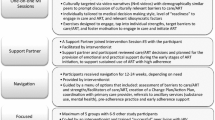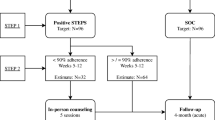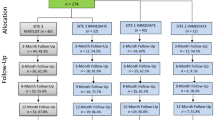Abstract
Suppressing HIV viral loads to undetectable levels is essential for ending the HIV/AIDS epidemic. We evaluated randomized controlled trials aimed to increase antiretroviral medication adherence and promote undetectable viral loads among people living with HIV through November 22, 2019. We extracted data from 51 eligible interventions and analyzed the results using random effects models to compare intervention effects between groups within each intervention and across interventions. We also evaluated the relation between publication date and treatment effects. Only five interventions increased undetectable viral loads significantly. As a whole, the analyzed interventions were superior to Standard of Care in promoting undetectable viral loads. Interventions published more recently were not more effective in promoting undetectable viral loads. No treatment category consistently produced significant increases in undetectable viral loads. To end the HIV/AIDS epidemic, we should use interventions that can suppress HIV viral loads to undetectable levels.


Similar content being viewed by others
Data Availability
Additional data are reported in Supplementary Materials. Data from any portion of the study can be obtained by contacting the corresponding author.
Code Availability
Not applicable.
References
Eisinger RW, Dieffenbach CW, Fauci AS. HIV viral load and transmissibility of HIV infection: undetectable equals untransmittable. JAMA. 2019;321(5):451–2.
Montaner JS, Wood E, Kerr T, Lima V, Barrios R, Shannon K, et al. Expanded highly active antiretroviral therapy coverage among HIV-positive drug users to improve individual and public health outcomes. J Acquir Immune Defic Syndr. 2010;55:S5–9.
Fauci AS, Redfield RR, Sigounas G, Weahkee MD, Giroir BP. Ending the HIV epidemic: a plan for the United States. J Am Med Assoc. 2019;321(9):844–5.
Joint United Nations Programme on HIV/AIDS (UNAIDS). UNAIDS 2016–2021 strategy: on the fast-track to end AIDS. UNAIDS Geneva. 2015.
Centers for Disease Control and Prevention. Monitoring selected national HIV prevention and careobjectives by using HIV surveillance data—United States and 6 dependent areas, 2018. HIVSurveillance Supplemental Report 2020;25(No. 2). http://www.cdc.gov/hiv/library/reports/hiv-surveillance.html. Published May 2020. Accessed 10 Feb 2021.
Kanters S, Park JJH, Chan K, Socias ME, Ford N, Forrest JI, et al. Interventions to improve adherence to antiretroviral therapy: a systematic review and network meta-analysis. Lancet HIV. 2017;4(1):e31–40.
Hutton B, Salanti G, Caldwell DM, Chaimani A, Schmid CH, Cameron C, et al. The PRISMA extension statement for reporting of systematic reviews incorporating network meta-analyses of health care interventions: checklist and explanations. Ann Intern Med. 2015;162(11):777–84.
Higgins JP, Altman DG, Gøtzsche PC, Jüni P, Moher D, Oxman AD, et al. The Cochrane Collaboration’s tool for assessing risk of bias in randomised trials. BMJ. 2011. https://doi.org/10.1136/bmj.d5928.
Silverman K, Holtyn AF, Rodewald AM, Siliciano RF, Jarvis BP, Subramaniam S, et al. Incentives for viral suppression in people living with HIV: a randomized clinical trial. AIDS Behav. 2019. https://doi.org/10.1007/s10461-019-02592-8.
Metsch LR, Feaster DJ, Gooden L, Matheson T, Stitzer M, Das M, et al. Effect of patient navigation with or without financial incentives on viral suppression among hospitalized patients with HIV infection and substance use: a randomized clinical trial. JAMA. 2016;316(2):156–70.
UNAIDS. An ambitious target to help end the AIDS epidemic. Joint United Nations Programme on HIV/AIDS. 2014.
Altice FL, Maru DS-R, Bruce RD, Springer SA, Friedland GH. Superiority of directly administered antiretroviral therapy over self-administered therapy among HIV-infected drug users: a prospective, randomized, controlled trial. Clin Infect Dis. 2007;45(6):770–8.
Andrade AS, McGruder HF, Wu AW, Celano SA, Skolasky RL Jr, Selnes OA, et al. A programmable prompting device improves adherence to highly active antiretroviral therapy in HIV-infected subjects with memory impairment. Clin Infect Dis. 2005;41(6):875–82.
Barnabas RV, van Rooyen H, Tumwesigye E, Brantley J, Baeten JM, van Heerden A, et al. Uptake of antiretroviral therapy and male circumcision after community-based HIV testing and strategies for linkage to care versus standard clinic referral: a multisite, open-label, randomised controlled trial in South Africa and Uganda. Lancet HIV. 2016;3(5):e212–20.
Belzer ME, Naar-King S, Olson J, Sarr M, Thornton S, Kahana SY, et al. The use of cell phone support for non-adherent HIV-infected youth and young adults: an initial randomized and controlled intervention trial. AIDS Behav. 2014;18(4):686–96.
Berg KM, Litwin A, Li X, Heo M, Arnsten JH. Directly observed antiretroviral therapy improves adherence and viral load in drug users attending methadone maintenance clinics: a randomized controlled trial. Drug Alcohol Depend. 2011;113(2–3):192–9.
Berger S, Schad T, von Wyl V, Ehlert U, Zellweger C, Furrer H, et al. Effects of cognitive behavioral stress management on HIV-1 RNA, CD4 cell counts and psychosocial parameters of HIV-infected persons. AIDS. 2008;22(6):767–75.
Berrien VM, Salazar JC, Reynolds E, Mckay K. Adherence to antiretroviral therapy in HIV-infected pediatric patients improves with home-based intensive nursing intervention. AIDS Patient Care STDS. 2004;18(6):355–63.
Chawana TD, Gandhi M, Nathoo K, Ngara B, Louie A, Horng H, et al. Defining a cutoff for atazanavir in hair samples associated with virological failure among adolescents failing second-line antiretroviral treatment. J Acquir Immune Defic Syndr (1999). 2017;76(1):55–9.
Cunningham WE, Weiss RE, Nakazono T, Malek MA, Shoptaw SJ, Ettner SL, et al. Effectiveness of a peer navigation intervention to sustain viral suppression among HIV-positive men and transgender women released from jail: the LINK LA randomized clinical trial. JAMA Intern Med. 2018;178(4):542–53.
de Bruin M, Hospers HJ, van Breukelen GJ, Kok G, Koevoets WM, Prins JM. Electronic monitoring-based counseling to enhance adherence among HIV-infected patients: a randomized controlled trial. Health Psychol. 2010;29(4):421.
DiIorio C, McCarty F, Resnicow K, McDonnell Holstad M, Soet J, Yeager K, et al. Using motivational interviewing to promote adherence to antiretroviral medications: a randomized controlled study. AIDS Care. 2008;20(3):273–83.
Garcia R, Pondé M, Lima M, de Souza AR, de Stolze SMO, Badaró R. Lack of effect of motivation on the adherence of HIV-positive/AIDS patients to antiretroviral treatment. Braz J Infect Dis. 2005;9(6):494–9.
Garofalo R, Kuhns LM, Hotton A, Johnson A, Muldoon A, Rice D. A Randomized controlled trial of personalized text message reminders to promote medication adherence among HIV-positive adolescents and young adults. AIDS Behav. 2016;20(5):1049–59.
Geldsetzer P, Francis JM, Sando D, Asmus G, Lema IA, Mboggo E, et al. Community delivery of antiretroviral drugs: a non-inferiority cluster-randomized pragmatic trial in Dar es Salaam, Tanzania. PLoS Med. 2018;15(9):e1002659.
Giordano TP, Cully J, Amico KR, Davila JA, Kallen MA, Hartman C, et al. A randomized trial to test a peer mentor intervention to improve outcomes in persons hospitalized with HIV infection. Clin Infect Dis. 2016;63(5):678–86.
Goggin K, Gerkovich MM, Williams KB, Banderas JW, Catley D, Berkley-Patton J, et al. A randomized controlled trial examining the efficacy of motivational counseling with observed therapy for antiretroviral therapy adherence. AIDS Behav. 2013;17(6):1992–2001.
Gross R, Bellamy SL, Chapman J, Han X, O’Duor J, Palmer SC, et al. Managed problem solving for antiretroviral therapy adherence: a randomized trial. JAMA Intern Med. 2013;173(4):300–6.
Ingersoll KS, Farrell-Carnahan L, Cohen-Filipic J, Heckman CJ, Ceperich SD, Hettema J, et al. A pilot randomized clinical trial of two medication adherence and drug use interventions for HIV+ crack cocaine users. Drug Alcohol Depend. 2011;116(1–3):177–87.
Javanbakht M, Prosser P, Grimes T, Weinstein M, Farthing C. Efficacy of an individualized adherence support program with contingent reinforcement among nonadherent HIV-positive patients: results from a randomized trial. J Int Assoc Physicians AIDS Care. 2006;5(4):143–50.
Kalichman SC, Kalichman MO, Cherry C, Eaton LA, Cruess D, Schinazi RF. Randomized factorial trial of phone-delivered support counseling and daily text message reminders for HIV treatment adherence. J Acquir Immune Defic Syndr. 2016;73(1):47–54.
Kiweewa FM, Wabwire D, Nakibuuka J, Mubiru M, Bagenda D, Musoke P, et al. Noninferiority of a task-shifting HIV care and treatment model using peer counselors and nurses among Ugandan women initiated on ART: evidence from a randomized trial. J Acquir Immune Defic Syndr. 2013;63(4):e125–32.
Kuo I, Liu T, Patrick R, Trezza C, Bazerman L, Uhrig Castonguay BJ, et al. Use of an mHealth intervention to improve engagement in HIV community-based care among persons recently released from a correctional facility in Washington, DC: a pilot study. AIDS Behav. 2019;23(4):1016–31.
Lester RT, Ritvo P, Mills EJ, Kariri A, Karanja S, Chung MH, et al. Effects of a mobile phone short message service on antiretroviral treatment adherence in Kenya (WelTel Kenya1): a randomised trial. Lancet. 2010;376(9755):1838–45.
Lucas GM, Mullen BA, Galai N, Moore RD, Cook K, McCaul ME, et al. Directly administered antiretroviral therapy for HIV-infected individuals in opioid treatment programs: results from a randomized clinical trial. PLoS ONE. 2013;8(7):e68286.
Macalino GE, Hogan JW, Mitty JA, Bazerman LB, DeLong AK, Loewenthal H, et al. A randomized clinical trial of community-based directly observed therapy as an adherence intervention for HAART among substance users. AIDS. 2007;21(11):1473–7.
McLaughlin MM, Franke MF, Munoz M, Nelson AK, Saldana O, Cruz JS, et al. Community-based accompaniment with supervised antiretrovirals for HIV-positive adults in Peru: a cluster-randomized trial. AIDS Behav. 2018;22(1):287–96.
Myer L, Phillips TK, Zerbe A, Brittain K, Lesosky M, Hsiao NY, et al. Integration of postpartum healthcare services for HIV-infected women and their infants in South Africa: a randomised controlled trial. PLoS Med. 2018;15(3):e1002547.
Naar-King S, Outlaw AY, Sarr M, Parsons JT, Belzer M, MacDonell K, et al. Motivational Enhancement System for Adherence (MESA): pilot randomized trial of a brief computer-delivered prevention intervention for youth initiating antiretroviral treatment. J Pediatr Psychol. 2013;38(6):638–48.
Nachega JB, Chaisson RE, Goliath R, Efron A, Chaudhary MA, Ram M, et al. Randomized controlled trial of trained patient-nominated treatment supporters providing partial directly observed antiretroviral therapy. AIDS (London, England). 2010;24(9):1273.
Orrell C, Cohen K, Mauff K, Bangsberg DR, Maartens G, Wood R. A randomized controlled trial of real-time electronic adherence monitoring with text message dosing reminders in people starting first-line antiretroviral therapy. J Acquir Immune Defic Syndr. 2015;70(5):495–502.
Pence BW, Gaynes BN, Adams JL, Thielman NM, Heine AD, Mugavero MJ, et al. The effect of antidepressant treatment on HIV and depression outcomes: results from a randomized trial. AIDS (London, England). 2015;29(15):1975–86.
Pradier C, Bentz L, Spire B, Tourette-Turgis C, Morin M, Souville M, et al. Efficacy of an educational and counseling intervention on adherence to highly active antiretroviral therapy: French prospective controlled study. HIV Clin Trials. 2003;4(2):121–31.
Ramirez-Garcia P, Côté J. An individualized intervention to foster optimal antiretroviral treatment-taking behavior among persons living with HIV: a pilot randomized controlled trial. J Assoc Nurses AIDS Care. 2012;23(3):220–32.
Rathbun RC, Farmer KC, Stephens JR, Lockhart SM. Impact of an adherence clinic on behavioral outcomes and virologic response in treatment of HIV infection: a prospective, randomized, controlled pilot study. Clin Ther. 2005;27(2):199–209.
Sabin LL, Bachman DeSilva M, Gill CJ, Zhong L, Vian T, Xie W, et al. Improving adherence to antiretroviral therapy with triggered real-time text message reminders: the China adherence through technology study. J Acquir Immune Defic Syndr. 2015;69(5):551–9.
Silveira MPT, Guttier MC, Page K, Moreira LB. Randomized controlled trial to evaluate the impact of pharmaceutical care on therapeutic success in HIV-infected patients in Southern Brazil. AIDS Behav. 2014;18(1):75–84.
Taiwo BO, Idoko JA, Welty LJ, Otoh I, Job G, Iyaji PG, et al. Assessing the viorologic and adherence benefits of patient-selected HIV treatment partners in a resource-limited setting. J Acquir Immune Defic Syndr. 2010;54(1):85–92.
van Loggerenberg F, Grant AD, Naidoo K, Murrman M, Gengiah S, Gengiah TN, et al. Individualised motivational counselling to enhance adherence to antiretroviral therapy is not superior to didactic counselling in South African patients: findings of the CAPRISA 058 randomised controlled trial. AIDS Behav. 2015;19(1):145–56.
Wagner GJ, Lovely P, Schneider S. Pilot controlled trial of the adherence readiness program: an intervention to assess and sustain HIV antiretroviral adherence readiness. AIDS Behav. 2013;17(9):3059–65.
White BL, Golin CE, Grodensky CA, Kiziah CN, Richardson A, Hudgens MG, et al. Effect of directly observed antiretroviral therapy compared to self-administered antiretroviral therapy on adherence and virological outcomes among HIV-infected prisoners: a randomized controlled pilot study. AIDS Behav. 2015;19(1):128–36.
Williams AB, Wang H, Li X, Chen J, Li L, Fennie K. Efficacy of an evidence-based ARV adherence intervention in China. AIDS Patient Care STDS. 2014;28(8):411–7.
Wohl AR, Garland WH, Valencia R, Squires K, Witt MD, Kovacs A, et al. A randomized trial of directly administered antiretroviral therapy and adherence case management intervention. Clin Infect Dis. 2006;42(11):1619–27.
Yotebieng M, Thirumurthy H, Moracco KE, Edmonds A, Tabala M, Kawende B, et al. Conditional cash transfers to increase retention in PMTCT care, antiretroviral adherence, and postpartum virological suppression: a randomized controlled trial. J Acquir Immune Defic Syndr. 2016;72(Suppl 2):S124–9.
Abas M, Nyamayaro P, Bere T, Saruchera E, Mothobi N, Simms V, et al. Feasibility and acceptability of a task-shifted intervention to enhance adherence to HIV medication and improve depression in people living with HIV in Zimbabwe, a low income country in sub-Saharan Africa. AIDS Behav. 2018;22(1):86–101.
Bhargava A, Booysen FLR, Walsh CM. Health status, food insecurity, and time allocation patterns of patients with AIDS receiving antiretroviral treatment in South Africa. AIDS Care. 2018;30(3):361–8.
Chang LW, Kagaayi J, Nakigozi G, Ssempijja V, Packer AH, Serwadda D, et al. Effect of peer health workers on AIDS care in Rakai, Uganda: a cluster-randomized trial. PLoS ONE. 2010;5(6):e10923.
Cowan FM, Davey C, Fearon E, Mushati P, Dirawo J, Chabata S, et al. Targeted combination prevention to support female sex workers in Zimbabwe accessing and adhering to antiretrovirals for treatment and prevention of HIV (SAPPH-IRe): a cluster-randomised trial. Lancet HIV. 2018;5(8):e417–26.
Fox MP, Pascoe SJS, Huber AN, Murphy J, Phokojoe M, Gorgens M, et al. Effectiveness of interventions for unstable patients on antiretroviral therapy in South Africa: results of a cluster-randomised evaluation. Trop Med Int Health. 2018;23(12):1314–25.
Hosseinipour M, Nelson JAE, Trapence C, Rutstein SE, Kasende F, Kayoyo V, et al. Viral suppression and HIV drug resistance at 6 months among women in Malawi’s option B+ program: results from the PURE Malawi Study. J Acquir Immune Defic Syndr (1999). 1999;2017(75 Suppl 2):S149–55.
McNairy ML, Lamb MR, Gachuhi AB, Nuwagaba-Biribonwoha H, Burke S, Mazibuko S, et al. Effectiveness of a combination strategy for linkage and retention in adult HIV care in Swaziland: the Link4Health cluster randomized trial. PLoS Med. 2017;14(11):e1002420.
Rawlings MK, Thompson MA, Farthing CF, Brown LS, Racine J, Scott RC, et al. Impact of an educational program on efficacy and adherence with a twice-daily lamivudine/zidovudine/abacavir regimen in underrepresented HIV-infected patients. J Acquir Immune Defic Syndr (1999). 2003;34(2):174–83.
Rosen MI, Dieckhaus K, McMahon TJ, Valdes B, Petry NM, Cramer J, et al. Improved adherence with contingency management. AIDS Patient Care STDS. 2007;21(1):30–40.
Smith SR, Rublein JC, Marcus C, Brock TP, Chesney MA. A medication self-management program to improve adherence to HIV therapy regimens. Patient Educ Couns. 2003;50(2):187–99.
Tuldrà A, Fumaz CR, Ferrer MJ, Bayés R, Arnó A, Balagué M, et al. Prospective randomized two-arm controlled study to determine the efficacy of a specific intervention to improve long-term adherence to highly active antiretroviral therapy. J Acquir Immune Defic Syndr (1999). 2000;25(3):221–8.
Wamalwa DC, Farquhar C, Obimbo EM, Selig S, Mbori-Ngacha DA, Richardson BA, et al. Medication diaries do not improve outcomes with highly active antiretroviral therapy in Kenyan children: a randomized clinical trial. J Int AIDS Soc. 2009;12(1):1–10.
Wohl DA, Golin CE, Knight K, Gould M, Carda-Auten J, Groves JS, et al. Randomized controlled trial of an intervention to maintain suppression of HIV viremia after prison release: the imPACT trial. J Acquir Immune Defic Syndr (1999). 2017;75(1):81–90.
HIV/AIDS Prevention Research Synthesis Project. Compendium of evidence-based interventions and best practices for HIV prevention. Centers for Disease Control and Prevention. https://www.cdc.gov/hiv/research/interventionresearch/compendium/index.html. Date last updated: March 2, 2021. Date Accessed 9 Mar 2021.
Acknowledgements
The study was supported by the National Institute on Allergy and Infectious Diseases and the National Institute on Drug Abuse of the National Institutes of Health under Grants R01AI117065 and T32DA07209. The content is solely the responsibility of the authors and does not represent the official views of the National Institutes of Health.
Funding
The study was supported by the National Institute on Allergy and Infectious Diseases and the National Institute on Drug Abuse of the National Institutes of Health under Grants R01AI117065 and T32DA07209. The content is solely the responsibility of the authors and does not represent the official views of the National Institutes of Health.
Author information
Authors and Affiliations
Contributions
FT: Conceptualization, data curation, formal analysis, investigation, methodology, writing—original draft. AR: Investigation, methodology. MN: Investigation, writing—review & editing. SP: Investigation. MA: Investigation. JL: Formal analysis. AH: Supervision, writing—review & editing. KS: Conceptualization, methodology, investigation, supervision, writing—review & editing.
Corresponding author
Ethics declarations
Conflict of interest
We declare that there are no conflict of interests.
Ethical Approval
Not applicable.
Informed Consent
Not applicable.
Additional information
Publisher's Note
Springer Nature remains neutral with regard to jurisdictional claims in published maps and institutional affiliations.
Supplementary Information
Below is the link to the electronic supplementary material.
Rights and permissions
About this article
Cite this article
Toegel, F., Rodewald, A.M., Novak, M.D. et al. Psychosocial Interventions to Promote Undetectable HIV Viral Loads: A Systematic Review of Randomized Clinical Trials. AIDS Behav 26, 1853–1862 (2022). https://doi.org/10.1007/s10461-021-03534-z
Accepted:
Published:
Issue Date:
DOI: https://doi.org/10.1007/s10461-021-03534-z




